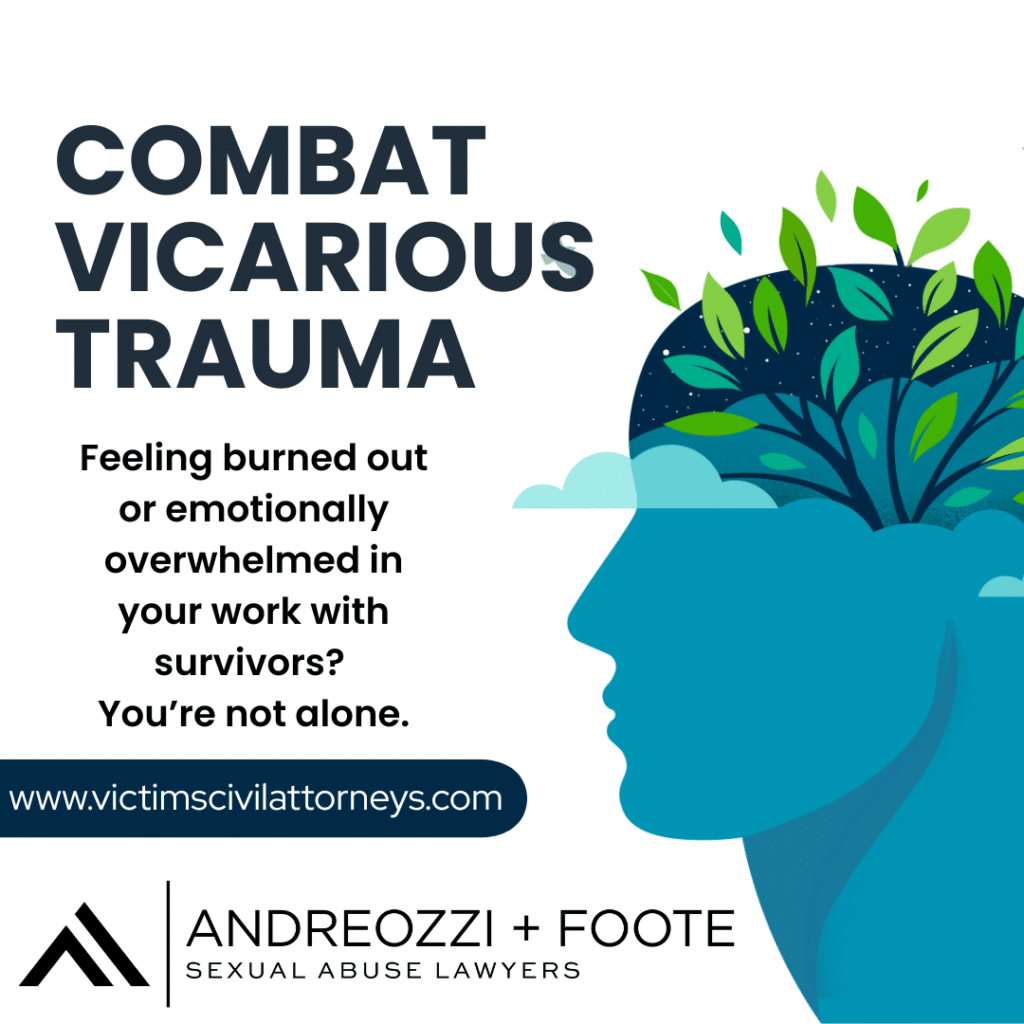We don’t talk about it enough—the weight we carry when we bear witness to trauma day in and day out. For those of us working with survivors of sexual abuse—whether as lawyers, victim advocates, counselors, or investigators—this work is a calling. But it can also come at a cost.
May is Mental Health Awareness Month, and there is no better time to pause and look inward. To check in with ourselves. Because the truth is, while we’re fiercely fighting for justice for others, many of us are neglecting our own healing.
This isn’t just burnout. This is vicarious trauma.
What Is Vicarious Trauma?
Vicarious trauma, also called secondary trauma, is the emotional residue we absorb from hearing the harrowing stories of others. It’s the shift in our worldview after too many depositions, too many interviews, too many nights lying awake with images and stories that aren’t even ours—yet feel like they are.
In the legal world, especially in firms like Andreozzi + Foote where we represent survivors of sexual abuse every single day, the emotional toll is real. You can’t unhear the stories. You can’t unsee the pain. And if you don’t process it—if you don’t acknowledge it—it will catch up to you.
The Stats Tell a Clear Story
- According to the American Bar Association, more than 40% of lawyers in public interest work experience secondary trauma.
- The National Child Traumatic Stress Network notes that up to 75% of child welfare professionals report symptoms of burnout or vicarious trauma.
- Turnover in the victim services field can exceed 50% due to chronic stress, poor self-care structures, and emotional exhaustion.
These numbers should serve as a warning and a wake-up call. If we don’t care for ourselves, we can’t keep doing this work. Not well. Not sustainably.
Recognizing the Signs
Ask yourself:
- Do you feel emotionally numb or disconnected?
- Are you quick to anger or overwhelmed by sadness after work?
- Are you losing sleep or turning to unhealthy coping mechanisms like alcohol, overeating, or isolation?
- Do you find yourself avoiding your clients’ stories or distancing yourself emotionally from your work?
If you’re nodding yes, it might be time to check in with yourself. A helpful resource is the Professional Quality of Life (ProQOL) Self-Assessment, which you can take here:
This simple tool can help you understand your levels of compassion satisfaction, burnout, and secondary traumatic stress.
How to Combat Vicarious Trauma
- Normalize the Conversation
It starts with us. Leaders in law firms, non-profits, and advocacy spaces need to create a culture where mental health isn’t taboo. Where supervision includes not just case review, but emotional check-ins. - Build Regular Self-Reflection Into Your Routine
Journaling. Meditation. Yoga. Walking in nature. Whatever brings you back to yourself—make it non-negotiable. - Set Boundaries
You are not the pain you witness. You are not responsible for healing others. You are responsible for showing up with compassion—but not at the expense of your own well-being. - Seek Peer Support
Community is everything. Join peer supervision groups. Talk to a therapist who understands vicarious trauma. At Andreozzi + Foote, we encourage our team to lean on one another—we’ve built a culture that values each other as much as we value the work. - Celebrate the Wins
Sometimes justice takes years. Sometimes we lose cases we should’ve won. But take time to celebrate when a survivor finds their voice. When a predator is held accountable. When your work leads to healing.
Your Healing Is Not a Luxury—It’s a Necessity
I know this work is sacred. It’s hard. I also know that we cannot ask survivors to be vulnerable, to sit in the center of their pain, if we ourselves are not willing to be honest about ours.
Mental Health Awareness Month is not just about raising awareness. It’s about recommitting to our own healing so that we can keep showing up for others.
To all my fellow warriors in the courtroom, in advocacy centers, in therapy rooms—take care of yourselves. You matter. Your mental health matters. And your healing is just as important as the survivors you so tirelessly fight for.
If you or a colleague is struggling with the emotional toll of this work, we encourage you to reach out for support. Visit Andreozzi + Foote to learn more about how our sexual abuse attorneys not only serve survivors but care for the team that serves them.
Because we can’t pour from an empty cup—and justice, real justice, demands we stay whole.



